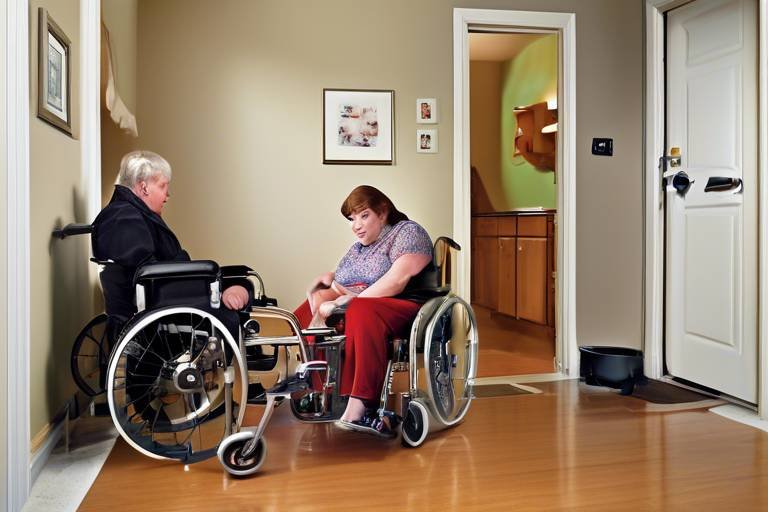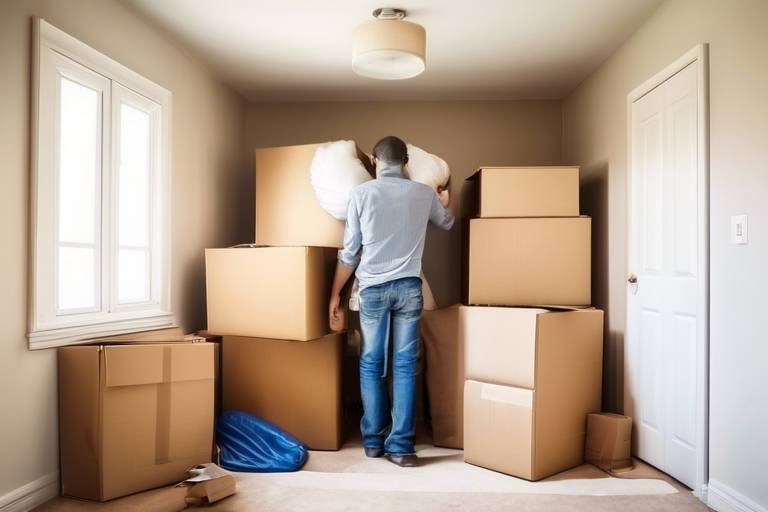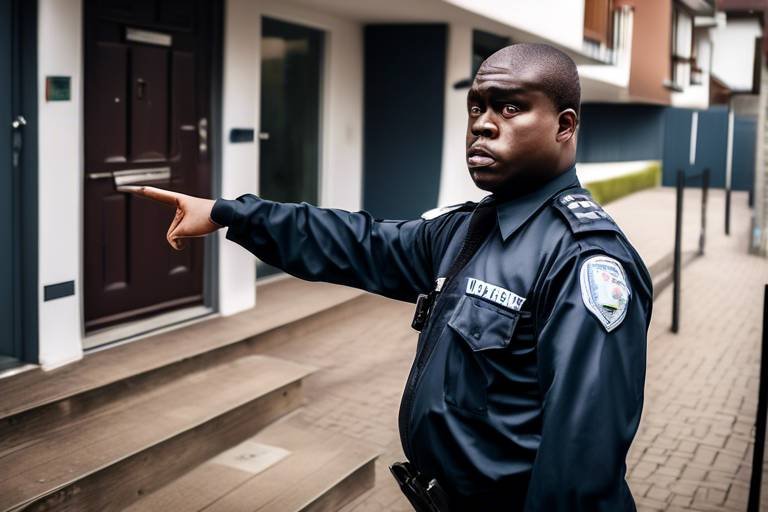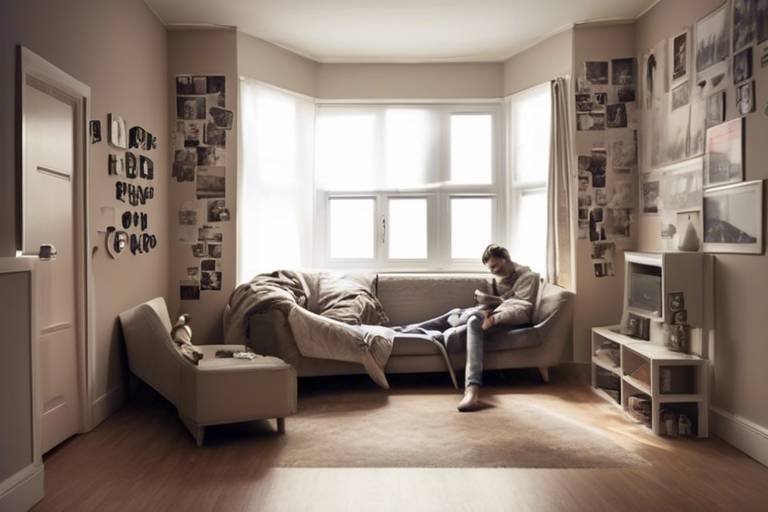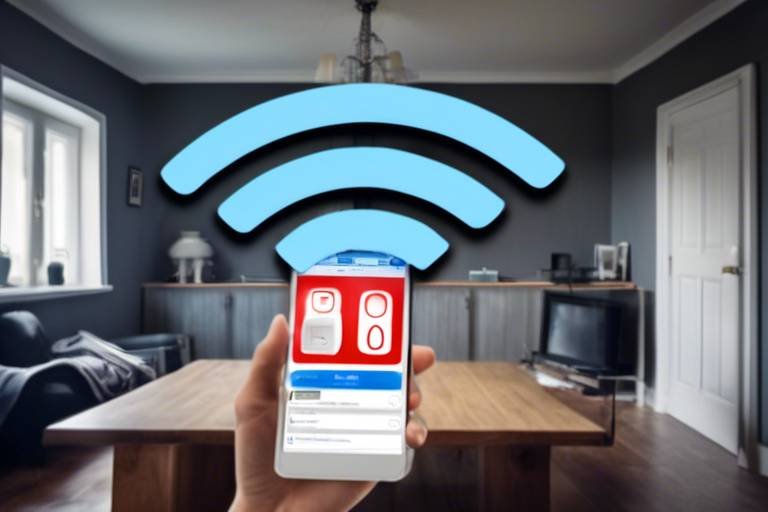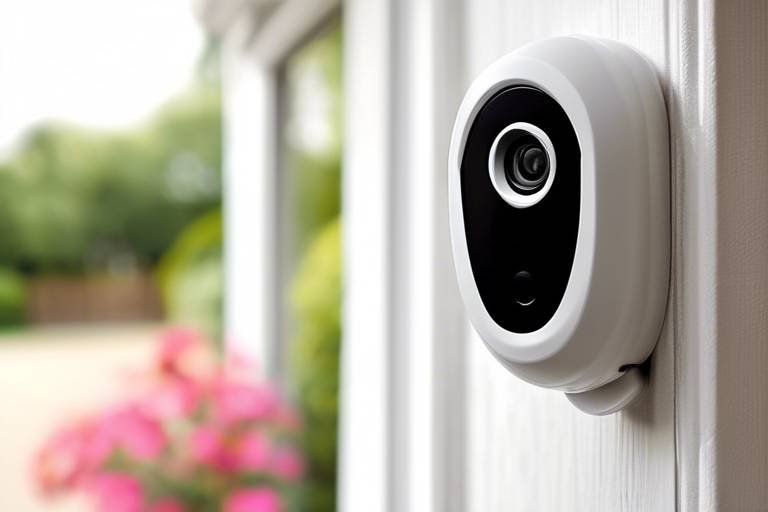Installing Security Cameras - DIY vs Professional Installation
In today's world, where security is a top priority for both homes and businesses, the decision to install security cameras is crucial. But here's the kicker: should you take the plunge and do it yourself, or is it better to call in the pros? This article dives into the nitty-gritty of both options, weighing the pros and cons to help you make an informed choice that suits your needs and budget.
When it comes to DIY installation, one of the most appealing aspects is the potential for significant cost savings. You can save a pretty penny by skipping the installation fees that professionals would charge. Plus, there's a certain satisfaction in rolling up your sleeves and taking control of your security setup. Imagine it: you get to choose the exact placement of your cameras, ensuring that every corner of your property is covered just the way you want it.
Another advantage is the flexibility that DIY offers. You can take your time, researching the best products, and fitting them into your schedule. There's no rush, no pressure from a contractor. You can install your cameras at your own pace, and if you decide to upgrade or change the layout later, you can easily do so without worrying about additional costs. Plus, with a plethora of online tutorials and resources available, even the most novice of DIYers can feel empowered to tackle this project.
On the flip side, hiring professionals for your security camera installation brings a whole different set of advantages. First and foremost is the expertise that comes with experience. Professionals know their stuff; they can assess your property and determine the best camera placements for optimal coverage. They also have the technical know-how to handle complex systems, which can be a lifesaver if you're not particularly tech-savvy.
Moreover, professional installation often includes a warranty on both the equipment and the installation service. This means that if something goes wrong, you have the peace of mind knowing that it’s covered. Additionally, many professional services offer ongoing support, which can be invaluable if you encounter any issues down the road. In short, while DIY may save you money upfront, the long-term reliability and support from professionals can be worth the investment.
Understanding the financial implications of DIY versus professional installation is crucial. Let’s break it down:
| Cost Aspect | DIY Installation | Professional Installation |
|---|---|---|
| Equipment Costs | Varies (typically lower) | Varies (often higher due to service fees) |
| Installation Fees | None | Typically $100-$500+ |
| Long-Term Support | Self-Support | Included with service |
This table provides a clear snapshot of what you might expect to pay for each option. While DIY installation may seem cheaper in the short term, consider the potential costs of troubleshooting and repairs if things go awry.
Time is another vital factor in deciding between DIY and professional installation. If you opt for DIY, you might find yourself spending several weekends wrestling with wires and configurations. Depending on your skill level, this could take anywhere from a few hours to several days. On the other hand, professional installation can usually be completed in just a few hours, allowing you to get back to your life without the hassle. Think about your schedule: is it worth the time investment to learn and do it yourself, or would you prefer a quick, hassle-free installation?
Assessing your technical skills can significantly influence your choice. If you’re comfortable with technology and have a knack for gadgets, a DIY installation might be right up your alley. However, if the thought of dealing with wires and settings makes your head spin, it might be wise to leave it to the experts. Remember, the last thing you want is to end up with a security system that doesn’t work properly because you were in over your head!
Customization options vary between DIY and professional installations. With DIY, you have full control over every aspect of your system, from the types of cameras to the settings and features. This can be a huge plus if you have specific needs or preferences. However, professionals may offer advanced systems with features you might not even know exist, providing you with options that could enhance your security significantly.
Understanding warranty implications is essential when installing security cameras. DIY installations might not come with warranties unless you purchase extended coverage for the equipment. In contrast, professional installations often include warranties on both the equipment and the installation service, providing you with peace of mind. If something goes wrong, you’ll have trained specialists ready to assist you, which can save you a lot of headaches in the long run.
Both DIY and professional installations can lead to pitfalls. Common mistakes include:
- Choosing the wrong camera type for your needs
- Improper placement that leaves blind spots
- Neglecting to secure your network, making it vulnerable to hacking
By being aware of these mistakes, you can take steps to avoid them, ensuring a more effective setup regardless of which installation route you choose.
Q: Can I install security cameras myself?
A: Yes, many homeowners opt for DIY installations. However, it’s important to assess your technical skills and comfort level with technology.
Q: What are the benefits of hiring professionals?
A: Professionals bring expertise, efficiency, and often provide warranties and ongoing support, which can be invaluable.
Q: How much does professional installation cost?
A: Costs can vary widely, typically ranging from $100 to $500 or more, depending on the complexity of the system.
Q: What common mistakes should I avoid?
A: Avoid choosing the wrong camera type, improper placement, and neglecting network security.

Benefits of DIY Installation
When it comes to installing security cameras, many homeowners and business owners face a crucial decision: should they tackle the project themselves or hire professionals? Opting for DIY installation can be incredibly rewarding, both financially and personally. Imagine the satisfaction of knowing that you took charge of your own security system, customizing it to fit your unique needs! Not only does this approach allow for a more personalized setup, but it can also save you a significant amount of money.
One of the primary benefits of DIY installation is the flexibility it offers. You can choose the exact placement of your cameras, ensuring that every corner of your property is covered according to your preferences. Want to move a camera to a different location? No problem! With DIY, you have the freedom to make adjustments as needed without having to schedule a visit from a technician. This level of control is particularly appealing for those who enjoy hands-on projects or have specific ideas about how their security system should function.
Furthermore, DIY installation can be a great learning experience. As you navigate the setup process, you'll gain valuable technical skills and knowledge about your security system. This newfound expertise can empower you to troubleshoot issues in the future, making you less reliant on outside help. Plus, let’s be honest, there’s a certain thrill in figuring things out on your own—it's like solving a puzzle where the reward is the enhanced safety of your home or business.
Of course, the financial aspect cannot be overlooked. Hiring professionals often comes with a hefty price tag. In contrast, with DIY installation, you only pay for the equipment itself, which can lead to substantial savings. For those on a budget, this can be a game-changer. Just think about the extra features or upgrades you could invest in with the money saved from labor costs!
However, it’s important to remember that while DIY installation has its perks, it also comes with responsibilities. You’ll need to research the best equipment for your needs, understand the installation process, and possibly troubleshoot any issues that arise. To help you get started, here’s a quick overview of what you might need to consider:
- Equipment Selection: Research different types of cameras and their features.
- Installation Process: Familiarize yourself with the installation steps and requirements.
- Ongoing Maintenance: Plan for how you will maintain and troubleshoot your system.
In summary, choosing to install security cameras yourself can be a fulfilling and cost-effective option that provides flexibility and control. Just be prepared to invest some time and effort into the project. If you feel confident in your abilities and are excited about the prospect of creating your own security system, DIY installation could be the perfect choice for you!

Advantages of Professional Installation
When it comes to installing security cameras, one of the most significant advantages of opting for professional installation is the level of expertise that comes with it. Professionals are trained to assess your property and determine the best locations for cameras, ensuring that your security system is maximally effective. Imagine trying to solve a complex puzzle; while you might get some pieces in the right place, a skilled puzzle master will see the whole picture and know where each piece fits perfectly.
Another crucial benefit of hiring professionals is the quality of installation. They have the right tools and experience to handle various types of systems, whether it’s a simple setup or a complex multi-camera arrangement. This means that you won’t have to worry about wiring issues, camera placement, or connectivity problems. Professionals can troubleshoot potential issues before they become headaches, saving you time and frustration.
Moreover, professional installers often provide a warranty or guarantee for their work. This means that if something goes wrong after installation, you have the peace of mind knowing that help is just a phone call away. In contrast, if you install the system yourself and encounter issues, you may be left to figure it out alone, which can be daunting.
Additionally, professionals can offer valuable insights and recommendations based on your specific security needs. They can suggest advanced features such as motion detection, night vision, and cloud storage options that you might not have considered. This level of customization can significantly enhance your security setup.
In summary, while DIY installation may seem appealing for its cost-saving potential, the advantages of professional installation are compelling. With their expertise, quality workmanship, warranty support, and personalized recommendations, professionals can help ensure your security system is not only installed correctly but also tailored to meet your unique needs.
- What should I look for in a professional installer? Look for certifications, reviews, and experience in the field.
- How long does professional installation typically take? Depending on the complexity, it can range from a few hours to a full day.
- Will I be trained on how to use the system after installation? Most professionals provide a tutorial on how to operate your new system.
- Are there ongoing costs associated with professional installation? Yes, consider potential maintenance fees and subscription costs for advanced features.

Cost Comparison
When it comes to installing security cameras, understanding the financial implications of your choices is crucial. Whether you opt for a DIY approach or go for professional installation, the costs can vary significantly. Let’s break it down.
Starting with DIY installation, the initial outlay can seem appealing. You might spend anywhere from $100 to $500 on equipment, depending on the quality and features of the cameras you choose. For instance, basic models can be quite affordable, while high-definition cameras with smart features may push your budget higher. However, the beauty of DIY is that you can spread out your spending. You can purchase cameras one at a time, allowing you to control your budget more effectively.
On the flip side, hiring professionals usually comes with a heftier price tag. Professional installation costs can range from $200 to $1,000, depending on the complexity of the system and the number of cameras. This fee typically includes not just the installation, but also the expertise of trained technicians who can ensure everything is set up correctly. While it might feel like a bigger hit to your wallet up front, think of it as an investment in peace of mind.
To further illustrate the cost differences, here’s a simple comparison table:
| Installation Type | Estimated Cost | Pros | Cons |
|---|---|---|---|
| DIY Installation | $100 - $500 |
|
|
| Professional Installation | $200 - $1,000 |
|
|
In summary, while DIY installation might seem like the budget-friendly option, it’s essential to consider the hidden costs of your time and potential errors. Conversely, professional installation offers a **hassle-free experience** but can strain your finances. Ultimately, the choice will depend on your budget, your confidence in handling technical tasks, and how much you value your time.
Q: What is the average cost of a DIY security camera system?
A: The average cost can range from $100 to $500, depending on the type and number of cameras you choose.
Q: Are professional installations worth the cost?
A: Yes, professional installations provide expertise and can save you time, ensuring your system is set up correctly.
Q: Can I install security cameras myself if I'm not tech-savvy?
A: While many DIY systems are designed for ease of use, lacking technical skills might lead to installation errors. Consider professional help if you're unsure.
Q: Do DIY installations come with warranties?
A: Warranties often depend on the camera manufacturer. However, DIY setups typically do not offer the same level of support as professional installations.

Time Considerations
When it comes to installing security cameras, time is a critical factor that can significantly influence your decision between a DIY approach and hiring professionals. Have you ever thought about how much time you can realistically dedicate to this project? If you're the kind of person who enjoys tinkering and has a flexible schedule, a DIY installation might sound appealing. You can take your time, research, and even make adjustments as you go. However, if you're someone who has a busy lifestyle, juggling work and family commitments, the time investment in a DIY project might not be worth it.
On the other hand, hiring professionals can save you a substantial amount of time. Imagine coming home after a long day, and instead of wrestling with wires and camera angles, you find that your security system is already up and running! Professionals typically have the expertise to complete installations quickly and efficiently, often within a few hours, depending on the complexity of the system. They know the common pitfalls and can troubleshoot issues on the fly, which is something that might take you much longer to figure out if you're going it alone.
To further illustrate the time considerations, let's break down the estimated time commitments for both options:
| Installation Method | Estimated Time Required |
|---|---|
| DIY Installation | 4-10 hours (depending on complexity) |
| Professional Installation | 2-5 hours |
In addition to the initial setup time, don't forget to factor in the time for ongoing maintenance and troubleshooting. DIY installations might require you to spend additional hours figuring out how to adjust settings or fix issues, while professionals often provide support and maintenance services that can alleviate this burden. So, if you're weighing your options, consider not just the immediate time investment but also the long-term commitment required for upkeep.
Ultimately, the choice between DIY and professional installation boils down to your personal circumstances. Are you ready to roll up your sleeves and dedicate a weekend to this project, or would you prefer to hand it off to someone who can get it done quickly? Either way, understanding the time implications can help you make a more informed decision that aligns with your lifestyle and security needs.
- How long does it take to install security cameras? The time varies based on the installation method; DIY can take 4-10 hours, while professionals typically complete it in 2-5 hours.
- Can I install security cameras myself? Yes, but it requires time, effort, and some technical skills to ensure proper placement and functionality.
- What if I encounter issues during DIY installation? Troubleshooting can take additional time, and you may need to consult online resources or forums for help.
- Will professionals provide ongoing support? Many professional services offer maintenance and support after installation, which can save you time in the long run.

Technical Skills Required
When it comes to installing security cameras, the question of technical skills often arises. Are you a tech-savvy individual who can navigate the world of wires and software, or do you find yourself scratching your head at the mere thought of configuring a new device? Understanding the level of expertise required for a successful installation can significantly influence your decision between a DIY approach and hiring professionals.
For those considering a DIY installation, a basic understanding of electronics and networking is essential. You’ll need to be comfortable with tools like drills and screwdrivers, as well as possess some knowledge of how to connect the cameras to your home network. Here are a few technical skills that can come in handy:
- Basic Wiring Knowledge: Knowing how to handle low-voltage wiring can be a huge plus.
- Networking Skills: Familiarity with Wi-Fi settings and router configurations is crucial for IP camera installations.
- Software Installation: Being able to install and configure software for viewing your camera feeds is necessary.
On the flip side, if you opt for professional installation, you can breathe a sigh of relief. Professionals come equipped with the necessary skills and tools to handle even the most complex setups. They are trained to deal with various systems and can ensure that everything is functioning optimally. This means you won’t have to worry about the nitty-gritty details of installation. You might think of it as hiring a chef to prepare a gourmet meal instead of trying to cook it yourself—sometimes, it’s just better to let the experts handle it!
However, if you feel confident in your abilities, a DIY installation can be a rewarding project. Just remember, the learning curve can be steep, and troubleshooting can become a time-consuming task if you encounter issues. It’s essential to weigh your comfort level with technology against the potential benefits of a professionally installed system.
In summary, the technical skills required for installing security cameras can range from basic to advanced. If you’re not tech-savvy, hiring a professional might save you time and frustration. But if you enjoy hands-on projects and have a knack for technology, a DIY approach could also be a fulfilling endeavor.
Q: Do I need special tools for DIY installation?
A: Generally, you will need basic tools like drills and screwdrivers. Some systems may require additional tools for specific setups.
Q: How difficult is it to install security cameras on my own?
A: The difficulty can vary based on the type of system you choose. Simple systems can be relatively easy, while more advanced setups may require a deeper understanding of networking and electronics.
Q: What if I encounter technical issues during installation?
A: It’s always a good idea to consult the user manual or online forums for troubleshooting tips. If issues persist, consider contacting a professional for assistance.

System Customization
When it comes to security camera systems, one of the most appealing aspects is the ability to customize your setup to fit your unique needs. Whether you opt for a DIY installation or hire a professional, the level of customization can significantly impact your overall satisfaction with your security system. With DIY installations, you have the freedom to choose every component, from camera types to placement, ensuring that your system aligns perfectly with your specific security concerns.
Imagine being able to select the exact features you want—like night vision, motion detection, or even two-way audio. When you take the DIY route, you’re not just a passive consumer; you're the architect of your security solution. You can decide to install cameras in areas that are most vulnerable, or perhaps you want to add additional cameras later on without the need to call someone in. This flexibility is a major advantage of DIY installations.
On the flip side, professional installations also offer a degree of customization, but it often comes with a different set of limitations. Professionals typically have predefined packages or systems that they recommend based on your needs. While they can certainly tailor your system to some extent, you might find that their suggestions come from a place of experience rather than your personal preferences. This can sometimes lead to a system that is effective but not necessarily the perfect fit for your unique situation.
Moreover, professional installers often use advanced software to analyze your property and recommend the best camera placements and types. This means that while you may not have complete control over the initial setup, you benefit from their expertise in optimizing your system for maximum coverage and effectiveness. Here’s a quick comparison:
| Aspect | DIY Installation | Professional Installation |
|---|---|---|
| Control over Components | High | Moderate |
| Flexibility | High | Limited |
| Expertise | Variable | High |
| Initial Setup Time | Variable | Usually Faster |
| Long-term Adjustments | Easy | Requires Scheduling |
In addition to the components themselves, how you configure your system also plays a crucial role in customization. DIY installations allow you to set up the software and adjust settings to your liking. You can tweak notifications, adjust sensitivity levels, and even manage how your cameras record footage based on your specific needs. This is particularly beneficial if you have pets or children, as you can set the system to ignore minor movements while still alerting you to significant activity.
On the other hand, while professional services will set up the software for you, they may not always provide the same level of ongoing customization. If you want to make changes later, you might have to contact them again, which could incur additional costs. Therefore, if you foresee needing frequent adjustments or expansions to your system, a DIY approach may offer the best long-term solution.
Ultimately, the choice between DIY and professional installation boils down to how much control you want over your security system. If you’re someone who enjoys tinkering and wants to ensure everything is just right, going the DIY route might be the way to go. However, if you prefer the peace of mind that comes from having an expert handle the complexities of installation, a professional service may be more suitable.
- Can I customize my DIY security camera system? Yes! DIY installations allow for extensive customization, including camera types, placements, and software settings.
- What are the limitations of professional installations regarding customization? While professionals can tailor your system, they often have predefined packages and may not accommodate every personal preference.
- How do I choose between DIY and professional installation? Consider your technical skills, budget, and how much control you want over the customization of your security system.

Warranty and Support
When it comes to installing security cameras, understanding the warranty and support options available can significantly influence your decision between DIY and professional installation. With DIY installations, you often rely on the manufacturer's warranty for the equipment itself. This means that if something goes wrong due to a manufacturing defect, you may be covered. However, if you make an error during installation—like misplacing a camera or improperly configuring the software—you might void that warranty. This is a crucial point to consider because while you might save money upfront, any mistakes could lead to additional costs down the line.
On the other hand, when you hire professionals, you usually receive a warranty that covers both the equipment and the installation service. This can provide peace of mind, knowing that if something goes wrong, you have a team of experts to fall back on. Professional installers often offer a guarantee for their work, which means they will come back to fix any issues that arise within a certain timeframe, often at no extra cost. This level of support can be invaluable, especially for those who may not have the technical knowledge to troubleshoot problems themselves.
Let’s break down the differences in warranty and support between DIY and professional installations:
| Aspect | DIY Installation | Professional Installation |
|---|---|---|
| Equipment Warranty | Manufacturer’s warranty (may void if improperly installed) | Manufacturer’s warranty, plus installation guarantee |
| Support | Limited to manufacturer’s customer service | Comprehensive support from installation company |
| Cost of Repairs | Out-of-pocket for any mistakes | Typically covered under warranty |
Moreover, if you choose the DIY route, it's essential to familiarize yourself with the customer support resources provided by the manufacturer. Many companies offer online tutorials, FAQs, and community forums where you can seek help. However, this self-service approach might not be sufficient for everyone, especially if you encounter complex issues.
In contrast, professional installation usually comes with dedicated support channels, including phone support, email assistance, and sometimes even on-site troubleshooting. This means that if a camera goes offline or a software glitch occurs, you have a team ready to assist you promptly. In today’s fast-paced world, having immediate access to support can make all the difference in maintaining your security system’s integrity.
Ultimately, the choice between DIY and professional installation boils down to your comfort level with technology, your budget, and how much you value ongoing support. While DIY might seem appealing for its cost-effectiveness, the assurance of professional support and warranty coverage can provide invaluable security for your peace of mind.
- What is the typical warranty period for security cameras? Most manufacturers offer a warranty period ranging from one to three years, depending on the brand and model.
- Can I extend the warranty on my DIY-installed cameras? Some manufacturers offer extended warranty options for an additional fee, which can be beneficial if you plan to keep the cameras for a long time.
- What should I do if my camera malfunctions? If you have a DIY installation, contact the manufacturer’s support. If professionally installed, reach out to your service provider for assistance.

Common Mistakes to Avoid
When it comes to installing security cameras, whether you're going the DIY route or hiring professionals, there are some common pitfalls that can lead to ineffective surveillance. Imagine spending time and money on a system only to find out it doesn’t work as intended! To avoid this, let’s dive into the most frequent mistakes people make during installation.
One major mistake is poor camera placement. Many individuals install cameras at eye level, thinking they will capture the best view. However, this can make them vulnerable to tampering. Instead, consider mounting cameras higher up and angling them downwards to cover a wider area while keeping them out of reach. Think of it like a bird’s-eye view; the higher you go, the more you can see!
Another common error is neglecting the lighting conditions. If your camera is installed in a poorly lit area, it may not capture clear footage, especially at night. Always test the camera's performance in different lighting conditions. You wouldn’t want to miss crucial footage just because it was too dark, right? A good rule of thumb is to ensure that the area has adequate lighting or invest in cameras with night vision capabilities.
Additionally, many DIY installers forget to secure their connections. Loose wires can lead to intermittent connectivity issues, which can be frustrating when you need your system the most. Make sure all cables are tightly connected and consider using cable management solutions to keep everything organized. It’s like ensuring your phone charger is plugged in properly; otherwise, it just won’t work when you need it!
Moreover, not considering the network bandwidth can be a significant oversight. Security cameras consume a lot of data, especially if they are recording in high definition. If your internet connection isn’t robust enough, you may experience lag or loss of footage. Always check your network capacity before installation and consider upgrading if necessary.
Lastly, many people overlook the importance of regular maintenance. Once the cameras are installed, it’s easy to forget about them. However, regularly checking the camera angles, cleaning the lenses, and updating the software can make a huge difference in performance. Think of it like maintaining your car; a little upkeep goes a long way in ensuring everything runs smoothly.
To summarize, here’s a quick recap of common mistakes to avoid:
- Poor camera placement
- Neglecting lighting conditions
- Insecure connections
- Ignoring network bandwidth
- Skipping regular maintenance
By being aware of these mistakes, you can ensure that your security camera system is set up effectively and will serve its purpose of keeping your home or business safe.
Q: What is the best height to install security cameras?
A: Ideally, security cameras should be installed at a height of 8 to 10 feet to avoid tampering while still capturing clear images.
Q: Do I need a special internet connection for security cameras?
A: Yes, a robust internet connection is essential, especially for high-definition cameras, to ensure smooth streaming and recording.
Q: How often should I maintain my security cameras?
A: It’s recommended to check your cameras at least once a month for any issues, including cleaning lenses and checking software updates.
Q: Can I install security cameras myself?
A: Absolutely! With the right tools and knowledge, DIY installation is possible, but be mindful of the common mistakes mentioned above.
Frequently Asked Questions
- What are the main benefits of DIY security camera installation?
DIY installation allows you to save money, as you won’t have to pay for professional labor. You also get complete control over the placement and configuration of your cameras, which means you can tailor the system to fit your specific needs and preferences. Plus, it's a fun project that can give you a sense of accomplishment!
- Why should I consider hiring a professional for installation?
Hiring a professional ensures that your security system is installed correctly and efficiently. Professionals have the expertise to handle complex setups and can troubleshoot issues that may arise during installation. This peace of mind can be invaluable, especially if you're not tech-savvy.
- How do the costs compare between DIY and professional installation?
Generally, DIY installations are more budget-friendly since you only pay for the equipment. In contrast, professional installation can add a significant cost due to labor fees. However, consider the potential costs of mistakes made during DIY setups, which could lead to additional expenses.
- What time commitment is required for each installation method?
DIY installations can take longer, especially if you're unfamiliar with the process. You’ll need to account for setup, configuration, and troubleshooting. On the other hand, professionals can often complete the job in a fraction of the time, allowing you to enjoy your security system sooner.
- What technical skills do I need for DIY installation?
Basic technical skills are helpful for a DIY installation, such as understanding how to connect devices and configure software. However, the complexity of the system you choose can dictate the level of expertise required. If you feel overwhelmed, it might be best to hire a professional.
- Can I customize my security system with DIY installation?
Absolutely! One of the biggest advantages of DIY installation is the level of customization you can achieve. You can choose the types of cameras, their placements, and the settings that best suit your security needs. This flexibility allows you to create a system that truly reflects your preferences.
- What are the warranty implications for DIY versus professional installations?
Warranties can vary significantly between DIY and professional installations. Many manufacturers offer warranties for their products, but professional installations may come with additional service warranties. It's crucial to read the fine print to understand what is covered and for how long.
- What common mistakes should I avoid when installing security cameras?
Some common pitfalls include improper camera placement, overlooking power sources, and failing to secure connections. Additionally, not testing the system after installation can lead to missed issues. Take your time, plan ahead, and double-check everything to ensure a successful setup!





